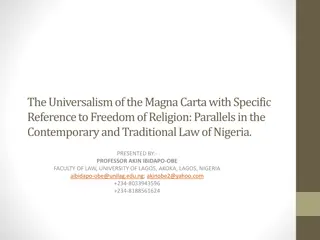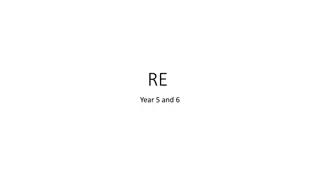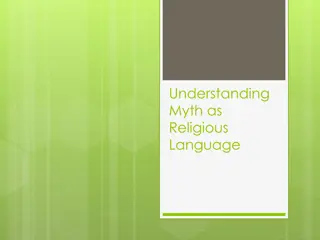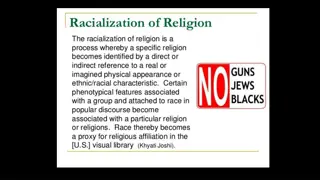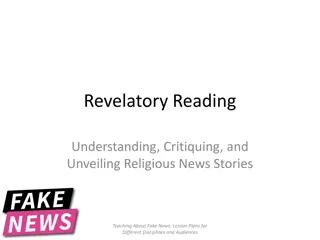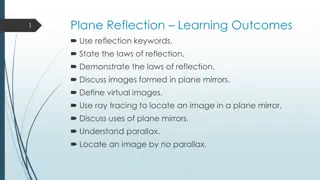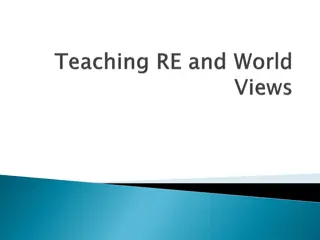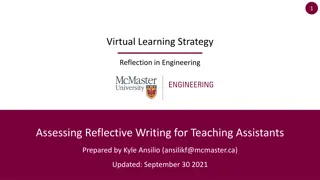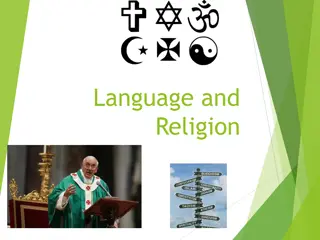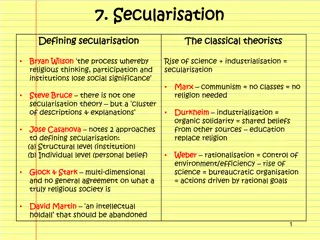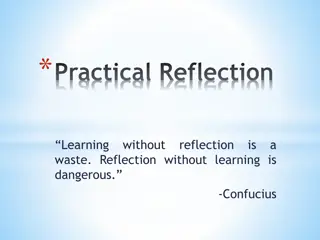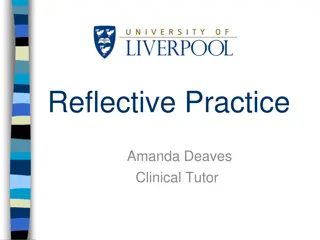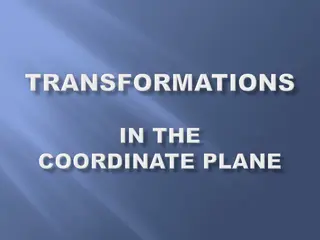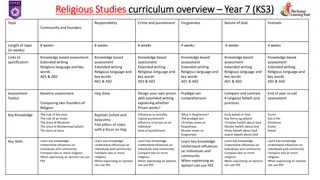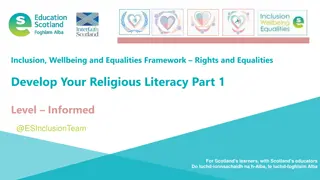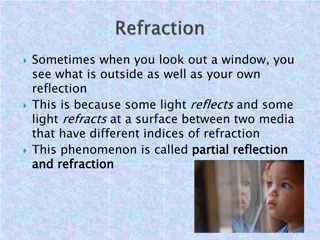Understanding Interfaith Harmony in Islamic Education
The third meeting conducted by the Islamic Education Faculty covered topics such as classroom regulations, tolerance among different religions, the concept of harmony among religious communities, and general challenges related to diversity in religious interpretations. The importance of maintaining
2 views • 13 slides
Status of Family Laws in India: Hindu vs. Religious Minorities
The family and personal status laws in India vary between Hindu law and those pertaining to religious minorities. While Hindu law has seen extensive reforms, discriminatory provisions still exist. In contrast, laws governing religious minorities have undergone fewer reforms, leading to greater inequ
2 views • 4 slides
The Universalism of Magna Carta: Freedom of Religion in Contemporary Nigerian Law
Magna Carta, a pivotal human rights document, is explored with a focus on its religious underpinnings and its influence on modern legal systems. The parallels and divergences between Magna Carta and Nigerian customary law regarding freedom of religion are examined. The implications of contemporary N
0 views • 16 slides
ACTIVE LEARNING Reflection and reflective writing
Explore the concepts of active learning, reflection, and reflective writing in education. Learn how reflection enhances problem-solving skills, flexibility in learning, and self-improvement. Discover the benefits of reflecting, the process of reflection, and how to apply active learning strategies e
7 views • 20 slides
Religious Education Skills Progression for Years 5 and 6
This document outlines the long-term plan for the RE curriculum for Year 5 and 6 students, focusing on topics such as living by Christian values, exploring wisdom from different faiths, understanding the creation of the world, and expressing faith through art. It also covers the progression of skill
0 views • 31 slides
Religious Policies of Queen Elizabeth I: Seeking a Middle Way
Queen Elizabeth I of England navigated religious turmoil by establishing a middle way that balanced Protestant and Catholic elements. Her reign saw the passing of acts like the Act of Supremacy and Act of Uniformity to consolidate her power and create a distinct Church of England. Despite facing opp
0 views • 21 slides
Understanding Religious Conflict: Definition and Types Explored
Religious conflict is a complex and recurring concept throughout history. Scholars have defined it as disagreements between religious groups. This conflict arises from contentious issues touching on ideology, morality, power, and identity, influenced by various socio-political, economic, and cultura
1 views • 13 slides
Understanding Myth as Religious Language: Exploring Concepts and Interpretations
Explore the multifaceted nature of myths as religious language, delving into their equivocal definitions, truth claims about God, and use of rhetorical devices. Discover the significance of myths in providing human understanding of God, revealing divine attributes, and addressing fundamental questio
0 views • 17 slides
Overview of Religious Studies Course at Ramsey Grammar School
The Religious Studies course at Ramsey Grammar School for Year 9 students covers topics such as Christianity, Islam, Life and Death, Good and Evil, beliefs, practices, and church diversity. Students will be assessed through a written examination at the end of Year 11, with no coursework requirement.
0 views • 23 slides
Evolution of Akbar's Religious Policy: A Historical Overview
In the 16th century, Akbar the Great implemented a revolutionary religious policy in the Mughal Empire. Initially a devout Sunni Muslim, Akbar evolved his stance to promote harmony and equality among all religions, fostering tolerance and understanding. This shift marked a significant departure from
1 views • 25 slides
Embracing Religious Pluralism for a Harmonious Society
Educate yourself on world religions and religious oppression, empathize with religious minorities, combat generalizations, and promote belief inclusion in all aspects of life for a more just and peaceful world.
0 views • 6 slides
Elizabethan Religious Settlement: Unity Amidst Division
Amid religious division in England, Queen Elizabeth I implemented a Religious Settlement in 1559 to unify the country. The settlement, a blend of Protestant and Catholic elements, aimed to maintain peace and prevent rebellions. Elizabeth's strategic compromise pleased most people, though lingering t
0 views • 14 slides
Understanding Secularism: Principles and Advantages
Secularism is the principle of separating government institutions from religious entities to ensure equal rights for believers and non-believers. It safeguards freedom of religious belief and practice, upholds religious freedom, and promotes democracy and fairness. Secularism aims to prevent religio
0 views • 21 slides
Understanding Religious Language: Cognitivism vs. Non-Cognitivism in the University Debate
This discussion explores the debate between cognitivism and non-cognitivism in religious language. Cognitivism asserts that religious claims aim to describe the world and can be true or false, while non-cognitivism argues that such claims express attitudes and cannot be verified. Flew's challenge qu
0 views • 9 slides
Unveiling Fake News in Religious Contexts: Lesson Plans and Critical Reflections
Explore the intersection of religion and fake news through lessons on understanding, critiquing, and unveiling fake stories in various religious landscapes. Delve into topics like the impact of belief systems, liberation theology, and societal consciousness stages. Uncover the role of critical refle
1 views • 11 slides
Guide to Using the BSA Calendar of Religious Observances
The BSA Calendar of Religious Observances is a valuable resource for scheduling scouting events in consideration of various religious holidays and observances. This guide provides an overview of the calendar, highlights important dates, and emphasizes the importance of respecting religious diversity
0 views • 8 slides
Understanding Reflection in Plane Mirrors
Explore the laws and principles of reflection in plane mirrors through detailed explanations and visual demonstrations. Learn about diffuse and specular reflection, virtual images, ray tracing techniques, and the significance of parallax. Discover how to locate images using reflection and understand
0 views • 17 slides
Exploring the Significance of Religious Education in Cultivating Understanding and Empathy
This content delves into how religious education prompts challenging questions about life's meaning, fosters personal reflection, and encourages empathy and respect for diverse beliefs. It aims to help children explore different religions, develop a sense of identity, and understand the impact of re
0 views • 46 slides
Enhancing Reflective Writing in Engineering: A Guide for Students and Teaching Assistants
This course module series aims to improve reflective writing skills for engineering students, teaching assistants, and instructors. It covers the definition of reflection, its importance in learning and professional development, and practical strategies for effective written reflection. The content
0 views • 36 slides
Understanding the Role of Language in Religion
Exploring the significance of language in religious contexts, this content discusses the functions, features, lexicon, grammar, and metaphorical aspects present in religious language. It delves into how religious language upholds spiritual beliefs, persuades believers, and expresses specific attitud
0 views • 8 slides
Understanding the Cultural Dimensions of Food and Religious Influences in Culinary Arts
Explore the impact of religious beliefs on food traditions and dietary restrictions across different cultures in the culinary world. Learn about the influence of major world religions on eating habits, food choices, and culinary practices. Discover how various religious groups, such as Christians, o
0 views • 26 slides
Self-Reflection in Healthcare: Importance, Definitions, and Practical Applications
Explore the significance of self-reflection in healthcare, covering its definitions, benefits, and real-life scenarios. Dive into the impact of self-reflection on personal growth, professional development, and patient care, with insights from influential quotes and expert perspectives. Understand ho
0 views • 19 slides
The Vital Role of Religious Institutions in Supporting Immigrants
Religions and immigration are interlinked in modern societies, where religions play a significant role in providing services, defending rights, and supporting the social cohesion of immigrants. Mainstream religious institutions serve as key actors in offering assistance, advocating for migrant right
2 views • 14 slides
Understanding Religious Language: Flew, Hare, Mitchell
Exploring the contrasting views of cognitivism and non-cognitivism in the context of religious language through the perspectives of Flew, Hare, and Mitchell. Delve into Flew's challenge on the undetectable gardener, Hare's concept of bliks, and Mitchell's response to the rationality of religious bel
0 views • 7 slides
Religious Accommodation in the Army: Advising Command
The content discusses the role of the Chaplain Corps in advising Soldiers and leaders on religious accommodation in the Army as of February 13, 2019. It covers learning objectives, legal foundations, Army policies, procedures, recent changes, and references related to religious accommodation. The in
0 views • 36 slides
Understanding Religious Discrimination Laws in California Workplace
Learn about the regulations and protections under FEHA and Title VII in California, including religious exemptions, accommodation requirements, case studies, and best practices to address discrimination issues effectively. Discover the statistical insights on religious discrimination complaints and
0 views • 45 slides
Understanding Secularisation: The Decline of Religious Influence in Society
Secularisation refers to the process in which religious thinking, participation, and institutions lose their social significance. This phenomenon is influenced by factors such as the rise of science, industrialisation, changing social attitudes, and the disengagement of the church from society. Evid
0 views • 8 slides
Philosophers' Views on Religious Experience: Insights and Critiques
This lesson delves into the perspectives of various philosophers such as Rudolph Otto, Richard Swinburne, John Hick, and Michael Persinger on religious experiences. It explores concepts like the numinous, religious knowledge, God's existence, and criticisms on the validity of religious experiences.
0 views • 7 slides
Philosophers' Views on Religious Experience: Insights from William James
Explore William James' perspective on religious experiences, including his views on existential and value judgments. Understand how James argued for the validity of religious experiences and their potential proof of God's existence. Delve into the implications of emotions and prior beliefs on interp
0 views • 7 slides
Religious and Social Conflicts Fueling the Rise of Absolutism in Europe
Social, economic, and religious conflicts in Europe played a significant role in the emergence of absolutism where monarchs wielded supreme power without sharing it with legislative bodies. Events like Spain's religious conflicts, Protestantism in England, the Spanish Armada, religious conflict in t
0 views • 10 slides
Religious Pluralism and Civil Society: A Paradox in Government Control
Understanding the intricacies of religious pluralism in the context of government control reveals a paradox where restricting religion can hinder social cohesion and economic growth. Through insights on the counterproductivity of control, the role of religious organizations in civil society, and the
0 views • 16 slides
US Religious Freedom Restoration Act (RFRA) Overview
The US Religious Freedom Restoration Act (RFRA) aims to protect the free exercise of religion by ensuring that governments do not substantially burden religious practices without compelling justification. It emphasizes striking a balance between religious liberty and governmental interests through t
0 views • 9 slides
Understanding Light Reflection and Refraction
Explore the fascinating world of light and its behavior with reflection and refraction. Learn about how light travels, bounces off objects, and bends in different mediums. Discover the properties of light, the phenomenon of refraction, and the laws governing reflection. Delve into topics such as reg
0 views • 12 slides
Enhancing Learning Through Reflective Practices: A Comprehensive Guide
Explore the significance of reflection in professional development, understanding various reflective practices, and engaging in activities to foster individual and group reflection. Discover the dynamics of cyclical learning, the cognitive and affective aspects of reflection, frameworks for improvem
0 views • 12 slides
Understanding Reflective Practice in Physiotherapy
Increase knowledge of reflective practice, review reflection models, grasp critical reflection's role in clinical placement, comprehend reflection's significance in physiotherapy practice, and prepare for assignments. Definitions of reflective practice, reasons for reflection, CSP expectations, deve
0 views • 27 slides
Understanding Reflection in Transformations
A reflection in transformations involves flipping a figure over a given line of reflection, resulting in new prime points. This process is illustrated with examples and methods in a coordinate plane. Discover the principles of reflection and how to apply them effectively.
0 views • 11 slides
Religious Studies Curriculum Overview for Year 7 and 8 (KS3)
Explore various topics such as responsibility, crime and punishment, forgiveness, nature of God, festivals, community, founders, worship, creation, life after death, rules and laws, relationships in this detailed Year 7 and 8 (KS3) Religious Studies curriculum. The curriculum includes assessments, e
0 views • 6 slides
Developing Religious Literacy for Educators in Scotland
This resource aims to enhance educators' understanding of religious literacy by exploring religious discrimination, core beliefs of major faiths, and additional learning sources. It encourages educators to consider the needs of learners in relation to their religious beliefs in Scotland.
0 views • 30 slides
Understanding Reflection and Refraction Phenomena in Optics
Reflection and refraction are fundamental phenomena in optics, occurring when light encounters surfaces with different indices of refraction. This results in partial reflection and refraction, with the amount of each depending on the angle of incidence. Beyond a critical angle, total internal reflec
0 views • 12 slides
Settling the Northern Colonies: Religious Transformation and Colonization
The Protestant Reformation led to the emergence of Puritanism in the Northern Colonies, with figures like Martin Luther and John Calvin shaping religious beliefs. The Massachusetts Bay Colony stood as a beacon of self-government and religious ideals, while dissenters like Anne Hutchinson and Roger W
0 views • 9 slides


